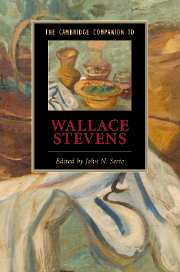Book contents
- Frontmatter
- Introduction
- 1 Wallace Stevens: A Likeness
- 2 Stevens and Harmonium
- 3 Stevens in the 1930s
- 4 Stevens and the supreme fiction
- 5 Stevens’ late poetry
- 6 Stevens and his contemporaries
- 7 Stevens and romanticism
- 8 Stevens and philosophy
- 9 Stevens’ seasonal cycles
- 10 Stevens and the lyric speaker
- 11 Stevens and linguistic structure
- 12 Stevens and painting
- 13 Stevens and the feminine
- 14 Stevens and belief
- Further reading
- Index
9 - Stevens’ seasonal cycles
Published online by Cambridge University Press: 28 May 2007
- Frontmatter
- Introduction
- 1 Wallace Stevens: A Likeness
- 2 Stevens and Harmonium
- 3 Stevens in the 1930s
- 4 Stevens and the supreme fiction
- 5 Stevens’ late poetry
- 6 Stevens and his contemporaries
- 7 Stevens and romanticism
- 8 Stevens and philosophy
- 9 Stevens’ seasonal cycles
- 10 Stevens and the lyric speaker
- 11 Stevens and linguistic structure
- 12 Stevens and painting
- 13 Stevens and the feminine
- 14 Stevens and belief
- Further reading
- Index
Summary
Familiar perhaps with only a handful of anthology pieces, readers of Wallace Stevens will be aware of the reappearance of the four seasons throughout his poems. Two of his volumes are called Transport to Summer and The Auroras of Autumn, and many other poems such as “Autumn Refrain,” “The Snow Man,” “The Paltry Nude Starts on a Spring Voyage,” and “Credences of Summer” make the repetition of the trope unignorable. Queried once about whether he was doing a formal “seasonal sequence,” Stevens denied it. However, he acknowledged that the writing of “An Ordinary Evening in New Haven,” then in progress, was a “development” of the ideas of “Credences of Summer,” adding, “That sort of thing might ultimately lead to another phase of what you call a seasonal sequence but certainly it would have nothing to do with the weather: it would have to do with the drift of one's ideas” (L 637).
How, one might ask, did the “drift” of Stevens' ideas lend itself to his reiterative adaptations of the seasons in so many poems throughout each of his volumes? Examining the scores of these poems, one quickly discovers that seasons are more than pastoral backdrop or lyrical evocation: they evolve from setting into trope and from trope into a larger mythos that lends a unity to what Stevens eventually came to call his cumulative “grand poem” (L 237). Additionally, the seasons of nature also evolve into a highly personal psychodrama, even a mode of survival, for a poet who found himself for the most part estranged from the supporting ties of family (parents, wife, siblings, daughter), friendships, and religious faith. “[O]ne might say that my father lived alone” (SP 4), said his daughter. As if in reply, the poet declares, “I have no life except in poetry” (913) and “There is no life except in the word of it” (257).
- Type
- Chapter
- Information
- The Cambridge Companion to Wallace Stevens , pp. 118 - 132Publisher: Cambridge University PressPrint publication year: 2007



